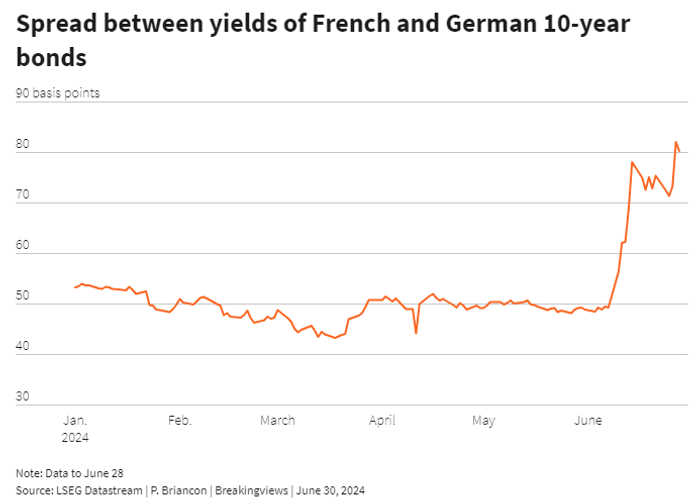Published 13:22 IST, July 1st 2024
Far-right win leaves France amid shock and chaos
RN received more than a third of the national vote but the final composition France’s main house of parliament depends on political horse-trading.
- Economy
- 3 min read

Bad or worse. France is fast heading towards a year of political, economic and maybe financial chaos. After the first round of parliamentary elections on Sunday, the prospect of a far-right government commanding an absolute majority of seats in the National Assembly can no longer be ruled out. Given the risks posed by the platform of Marine Le Pen’s Rassemblement National, the alternative – a political stalemate and unstable government – might be preferable.
RN received more than a third of the national vote but the final composition France’s main house of parliament depends on political horse-trading. In next Sunday’s second round the left, for now united under a New Popular Front banner, and the alliance supporting President Emmanuel Macron have to agree on one candidate with the best chance of succeeding in each district. If they don’t or voters don’t follow their instructions, far-right candidates, who came in first place in an unprecedented number of constituencies, will be elected.
If Jordan Bardella, RN’s would-be prime minister, fails to win a majority of seats, France will enter long months of political crisis. Macron’s clout would be reduced to a minimum following the failure of his gamble to call snap elections after his party was trounced in the European Parliament elections. According to some projections, the president would be able to count on fewer than 100 MPs in the 577-strong Assembly. That would weaken his ability to play kingmaker, even if he rallies MPs from the centre-right or the centre-left to form a minority government.
Such a government would soon be defined not by what it does but by what it is unable to do. It would be marked by constant bickering, stasis and impotence on urgent questions such as how to reduce a budget deficit running at more than 5% of GDP. And it would struggle to define what role France should play in the European Union on areas like the policy towards China, Ukraine or the green transition. Macron cannot call new elections for another year and his current term runs until 2027.

A far-right majority government might bring the certainty that markets sometimes favour. It could, however, trigger another kind of political instability if opponents take to the streets to protest the prospect of a far-right administration ruling Europe’s second-largest economy. And it may seriously spook investors once it unveils its first important decisions, probably in the autumn: Bardella’s platform is rich in tax cuts and unfunded promises.
Less than two months ago Macron hosted his annual powwow of top global CEOs and celebrated 15 billion euros of new investments pledged by the likes of Amazon, Microsoft and AstraZeneca. “Choose France”, he exhorted them. If they were asked today, they might choose to pass instead.
Context News
Marine Le Pen’s far-right National Rally (RN) party won the first round of France’s parliamentary elections on June 30, exit polls showed, but the final result will depend on two days of horse-trading before the run-off on July 7. The RN was seen winning around 34% of the vote, exit polls from Ipsos, Ifop, OpinionWay and Elabe showed shortly after voting ended at 8:00 p.m. local time. The left-wing coalition New Popular Front was projected to win around 29% of the vote, with the centrist alliance Together, supporting President Emmanuel Macron, seen winning between 20.5% and 23% of the popular vote.
Updated 13:22 IST, July 1st 2024